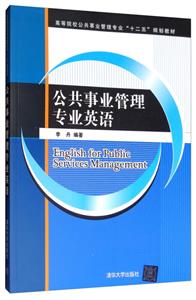-
>
闖進(jìn)數(shù)學(xué)世界――探秘歷史名題
-
>
中醫(yī)基礎(chǔ)理論
-
>
當(dāng)代中國政府與政治(新編21世紀(jì)公共管理系列教材)
-
>
高校軍事課教程
-
>
思想道德與法治(2021年版)
-
>
毛澤東思想和中國特色社會主義理論體系概論(2021年版)
-
>
中醫(yī)內(nèi)科學(xué)·全國中醫(yī)藥行業(yè)高等教育“十四五”規(guī)劃教材
公共事業(yè)管理專業(yè)英語 版權(quán)信息
- ISBN:9787302425205
- 條形碼:9787302425205 ; 978-7-302-42520-5
- 裝幀:一般膠版紙
- 冊數(shù):暫無
- 重量:暫無
- 所屬分類:>>
公共事業(yè)管理專業(yè)英語 內(nèi)容簡介
《公共事業(yè)管理專業(yè)英語》以公共事業(yè)管理專業(yè)知識為核心,系統(tǒng)梳理了西方公共事業(yè)管理相關(guān)理論的發(fā)展過程、主要流派及其代表性觀點。用英文全面介紹了中國主要公共事業(yè),包括教育、科技、文化、衛(wèi)生等管理的相關(guān)內(nèi)容。 此外,該書著眼于理論與實踐的有機(jī)結(jié)合,在內(nèi)容上創(chuàng)新性地增加了與公共事業(yè)管理實踐密切相關(guān)的實用英語,如:黨和國家主要機(jī)構(gòu)的英文介紹、與中國國情密切相關(guān)的政治、經(jīng)濟(jì)英文詞匯、專業(yè)英文文獻(xiàn)的查閱與整理方法、畢業(yè)論文寫作中英文翻譯技巧以及就業(yè)過程中的面試英語、英文商務(wù)信函的寫作等。 該書既注重專業(yè)性與學(xué)術(shù)性,也突出實用性與趣味性,對于實現(xiàn)“用英語深化專業(yè)知識”與“通過專業(yè)學(xué)英語”的有機(jī)結(jié)合,提高公共事業(yè)管理人才的專業(yè)素養(yǎng)與英語運用能力具有重要的現(xiàn)實價值。 該書適合作為高等學(xué)校公共事業(yè)管理、行政管理、社會保障等公共管理類相關(guān)專業(yè)的教學(xué)與研究用書,也可作為廣大公務(wù)員和社會組織人員以及任何對公共事業(yè)管理專業(yè)英語感興趣人士的學(xué)習(xí)參考用書或培訓(xùn)用書。 《公共事業(yè)管理專業(yè)英語》配有課件,下載地址為:http://www.tupwk.com.cn。
公共事業(yè)管理專業(yè)英語 目錄
1.1 What Is Public Service?
1.1.1 Definition of Public Service
1.1.2 Characters of Public Service
1.1.3 History of Public Service
1.2 Publicness of Public Service
1.2.1 Academic and Practical Research on Publicness of Public Service
1.2.2 Obstacles in Pursuing Publicness of Public Service
1.2.3 Suggestions and Solutions
1.3 Public Service in the Development of Public Administration Science
1.3.1 The Old Public Administration
1.3.2 The New Public Management
1.3.3 The New Public Service
1.4 What is Public Service Management?
1.4.1 Definition of Public Service Management
1.4.2 Public Service Motivation
1.5 Control of Public Service Qua
Chapter 2 Public Service Provision in China
2.1 Public Service Units in Chin
2.1.1 Whatls Public Service Unit?
2.1.2 How the PSUs Operate?
2.2 Public Service Provision in China-Science and Technology Services
2.2.1 The Basic Regulation on Science and Technology Services
2.2.2 Development of Science and Technology Services in China
2.3 Public Service Provision in China-Education Services
2.3.1 Basic Regulation on Education Services
2.3.2 Development of Education Services in China
2.4 Public Service Provision in China-Public Cultural Services
2.4.1 Definition and Contents of Public Cultural Services
2.4.2 Managing Organs of Public Cultural Services in China
2.4.3 Development of Public Cultural Services in China
2.5 Public Service Provision in China-Public Health Services
2.5.1 Basic Public Health Service in China
2.5.2 The Development of Public Health Service in China
……
Chapter 3 The Essence of Classics in Public Service Management
Chapter 4 Political Party and State Organ
Chapter 5 Academic English
Chapter 6 English at Work
Appendix
References
公共事業(yè)管理專業(yè)英語 節(jié)選
《公共事業(yè)管理專業(yè)英語》: 2.4.2 Managing Organs of Public Cultural Services in China Most of China's public cultural services are-managed by the Chinese government on five different levels. Top level: central departments, including Ministry of Culture and State Administration of Press, Publication, Radio, Film and Television. The Ministry of Culture is the national administrative organ for cultural and art undertakings. According to the plan approved by the State Council in March 1989, its main powers and responsibilities are: to administer art undertakings, mass cultural undertakings, libraries, cultural undertakings in minority nationality areas and the cultural work of juveniles and children; to administer training and education of cultural and art personnel, scientific research on art, and scientific and technological work on culture and the arts; to administer art markets and cultural and art exchange with Taiwan, and cultural and art exchange and liaison with foreign countries; to administer the State Cultural Relics Bureau. Second level: province, autonomous region and municipality directly under the central government. Corresponding organs are set up in the governments of provinces, autonomous regions and municipalities of Beijing, Tianjin, Shanghai and Chongqing, including a provincial or municipal cultural bureau, bureau of press, publication, radio, film and television. Third level: city and prefecture. For the most part only cultural bureaus are set up in governments at this level. Fourth level: county. Only cultural bureaus. Fifth level: township and town. Each township (town) government appoints a cadre in charge of cultural undertakings. 2.4.3 Development of Public Cultural Services in China In recent years, Party committees, governments and cultural departments at various levels, in light of the decisions and arrangements by the central leadership, took as the objective a modem public cultural service system that covers the whole society and guarantees the people's basic cultural rights. As a result, overall progress has been made with breakthroughs in key sectors, investment in public culture has continued to increase, a public cultural service network that reaches all urban and rural areas has taken shape, major cultural programs benefiting the people have been proceeding steadily, innovative approaches have been developed and implemented, the level of equality in public cultural service has been significantly raised, and public cultural service has become more institutionalized and standardized. According to statistics, spending on culture reached 140 billion RMB yuan nationwide in the first three years of the 12th Five-Year Plan period, exceeding the total of the 11th Five-Year Plan period which registered 122 billion RMB yuan. Since the policy of free access to public cultural facilities was launched in 2008, the central government has earmarked nearly 20 billion RMB yuan as support. As a result, public libraries and cultural centers have been setup in every county and comprehensive cultural stations in every township. Over the past few years, a number of major cultural programs have been initiated to benefit the general public, such as the nationwide project for sharing of cultural information resources, the project for the promotion of digital libraries, the project for the construction of public E-reading rooms, the project for mobile stage vehicles, and the project for the training of cultural professionals at the grassroots level. About 50,000 museums, art museums, libraries and cultural stations nationwide have been opened to public for free. The construction of national pilot zones on the public cultural service system has been kicked off, with an aim to gather experience and seek feasible approaches. The Spring Rain Project, an initiative that cultural volunteers serve frontier areas, facilitated coastal and inland areas' cultural aid to and cultural exchange with frontier provinces. Various measures have been adopted to guarantee cultural rights of peasant workers, the senior, children and the handicapped. Official documents have been formulated to regulate the land use, construction and service of public libraries and cultural centers. Legislation process for the Law on Guaranteeing Public Cultural Service and the Law on Public Libraries is proceeding well. ……
公共事業(yè)管理專業(yè)英語 作者簡介
李丹,管理學(xué)博士,東北大學(xué)文法學(xué)院行政管理系副教授,碩士生導(dǎo)師。主講國家精品視頻公開課“公共文化概說”,曾獲國家教學(xué)成果二等獎。在《中國行政管理》《自然辯證法研究》等期刊發(fā)表論文數(shù)十篇。出版專著《中國政府高技術(shù)產(chǎn)業(yè)管理創(chuàng)新》《小城鎮(zhèn)問題ABC》,主編東北大學(xué)“十二五”規(guī)劃教材《公共管理專業(yè)英語》。主持
- >
羅庸西南聯(lián)大授課錄
- >
朝聞道
- >
回憶愛瑪儂
- >
我從未如此眷戀人間
- >
企鵝口袋書系列·偉大的思想20:論自然選擇(英漢雙語)
- >
推拿
- >
巴金-再思錄
- >
詩經(jīng)-先民的歌唱















